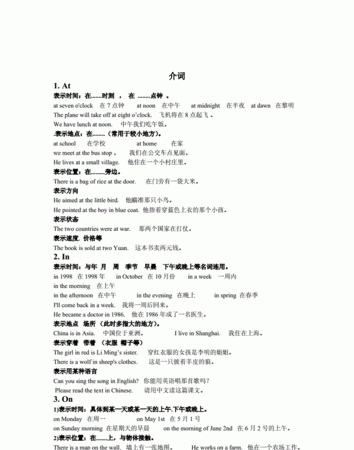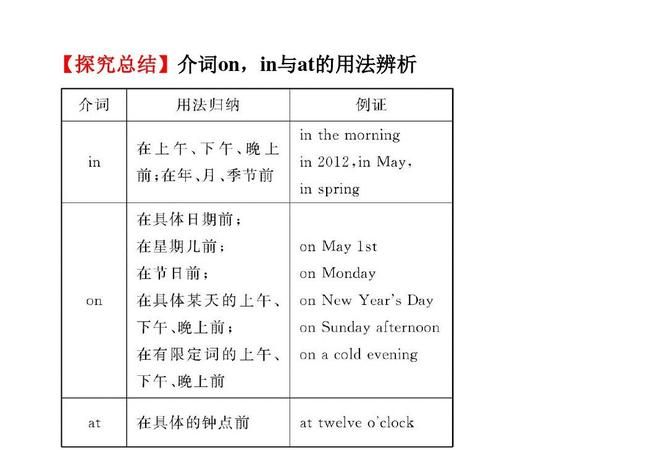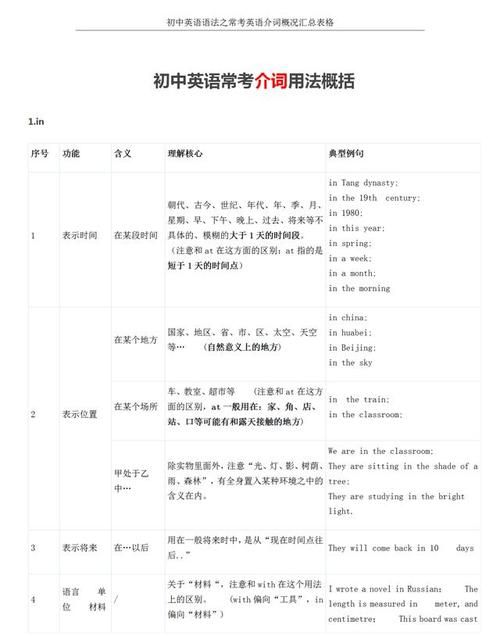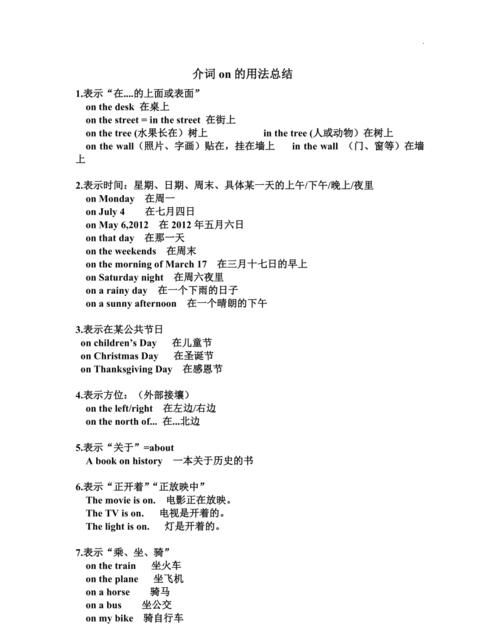本文目录
七年级上英语介词短语大全
其实常见的介词有很多,介词是英语里一个比较难的点.
在初中用的最多的是to,for,after,before,in,on,beside,into,from,by,at,around,with,about.
或者好一点的学校会额外教onto,till, across, during,since.如果为了应付考试,以上这些已经足够了,在初中阶段暂不需要掌握太多介词.
介词放哪是个很笼统的问题,一个句子可以是动介结构,也可以是动副结构.
1、动介就是介词放在动词的后面,短语里出现得最多:look at,pick up,look into.
2、动副结构是介词可以放在名词前面,也可以放在名词后面,如:(捡起某物)pick sth up,
某物就是当名词,up是介词,所以放后面.
而介词放在名词前面的情况在初中是最多的,只要背短语就可以知道.
介词应该不会在初中单独做一个知识点吧,介词考的最多的就是不定式和介词+ing这两个而已,所以不用太担心.

初一英语常用的介词有哪些短语
表示时间的介词:
at:用于表示时刻,时间的某一点。
on:用于星期,某天,某一天的上午,下午,晚上(指具体的某一天时,一律用on
in:用于表示周,月,季节,年,泛指上午,下午,晚上
before:在...之前
after:在...之后
by:在....前(时间)截止(到)...
until(till):直到.....为止
for:达...之久(表示过了多少时间)
during:在....期间
through:一直..(从开始到结束)
from:从...起(时间)
since:自从...以来(表示从以前某时一直到现在仍在继续)
in:过...后(未来时间)
within:不超过...的范围
表示场所,方向的介词:
at :在某地点(表示比较狭窄的场所)
in:在某地(表示比较宽敞的场所)
on:在...上面,有接触面
above:在...上方
over:在...正上方,是under的反义词
under:在..下面,在...之内
below :在...下方(不一定是正下方)
near:近的,不远的
by:在...的旁边,比near的距离要近
between:在两者之间
among:在三者或者更多的之中
around:环绕,在...的周围,在....的四周
in front of:在...的前面
behind:在...后边
in:在..之内,用于表示静止的位置
into:进入
out of :和into一样,也表示有一定的运动方向
along:沿着
across:横过(平面物体)
through:贯通,通过
to :达到..地点(目的地)或方向
for:表示目的,为了.....
from:从...地点起
其他介词
with:
和..在一起;
具有,带有;
用某种工具或方法
in:
表示用什么材料(例如:墨水,铅笔等)或用什么语言。表示衣着.声调特点时,不用with而用in。
by:通过...方法,手段
of:(属于)...的,表示...的数量或种类
from:来自(某地,某人),以...起始
without:没有,是with的反义词
like :像...一样
as :作为
against:反对,靠着
about:
关于,各处,四周;
询问某人,某物的情况或提出建议
介词按其构成可分为: 1. 简单介词 at, in, on, to, since, until等。如: He's worked there since 1998. 2. 复合介词 into, onto, out of等。如: She is out of school. 她毕业了。 3. 二重介词 from under, from behind, from out of, until after, except in等。如: I'm from out of town. 我是从城外来的。 4. 短语介词 because of, instead of, in spite of等。如: I went back not because of the rain, but because I was tired.我回去不是因为下雨,而是因为我累了。 二、介词的作用: 1. 表示地点: after, along, at, below, by, of, near, over, through, under等。如: Near the village the boys are skating on the ice. 男孩子们正在村子附近的冰上滑冰。 They lay down under the shade of a tree. 他们躺在一棵树的树阴下。 2. 表示时间: about, after, across, at, during, for, in, of, till, until等。如: After class he will tell us about the accident. 课后他将告诉我们有关事故的情况。 A heavy rain has been falling across three days. 一场大雨下了整整三天。 The accident happened during the night. 事故发生在夜间。 3. 表示动作: at, across, around, on, over, under等。如: The

小学英语语法介词用法
一.时间介词的用法辨析1.时间介词in、on、at、by的用法辨析
A.介词in用来表示一天中某段时间,指天、年、月、季节、周次等。如:in the morning
B.介词on用来表示某一天或星期几,指明具体的时间。如:on a rainy day
C.介词at用来表示特定的时间、节日、年龄等。如:at noon
D.介词by表示…的时候、到、等到…已经等用在天、时间的前面。如:by 2 o‘clock
2.时间介词in与after 的用法辨析
A.介词in + 一段时间用于一般将来时。如:We’ll go to school in two weeks.
B.介词after + 一段时间用于一般过去时。如:My mother came home after half an hour.
C.介词after + 时间点常用于一般将来时。如:We’ll go out for a walk after supper.
3.时间介词for与since的用法辨析
A.介词for 表示一段时间如:I have been living here for 10 years.
B.介词since 表示从过去某一时间以来如:I have been living here since 2000.
4.时间介词during与for的用法辨析
A.当所指的时间起止分明时用介词during如:He swims every day during the summer.
B.如果一段时间不明确则用介词for如:I haven’t seen her for years.
5.时间介词before与by的用法辨析
A.介词before表示“在…之前”如:He won’t come back before five .
B.介词by表示“到…时为止,不迟于…”如:The work must be finished by Friday.
6.时间介词till与until用法的异同
A.till和until用在肯定句中,均可表示“直到…为止”,如:I will wait till(until)seven o'clock.
B.till和until用在否定句中,均可表示“在…以前”或“直到…才”。
如:Tom didn't come back till(until)midnight.
C.till多用于普通文体,而 until则用于多种文体,并且在句子开头时,用until而不用till。
如:Until he comes back,nothing can be done.
7.不用介词表达时间的几种情况
A.当表示时间的词前有this, that时,其前面不用介词,如:this morning
B.当表示时间的词前有next时,其前面不用介词,如:next Sunday
C.当表示时间的词前有last时,其前面不用介词,如:last Sunday
D.当表示时间的词前有one, any, each, every, some或all时,其前面不用介词,如:You can come any day.
二.方位介词与地点介词的用法辨析1.方位介词on, over, above的用法辨析
A.介词on表示一物放在另一物上面,两者紧贴在一起,如:The book is on the table.
B.介词over表示一种垂直悬空的上下关系,即“在…上方”,如:Is there any bridge over the river?
C.介词above表示一般的“高于…”,“在…之上”,如:There was an electric clock above his bed.
2.方位介词under与below的用法辨析
A.介词under是over的反义词即“在…下方”,如:They were seen under the tree.
B.介词below是above的反义词即“低于…”,“在…之下”,如:They live below us.
3.方位介词across,、through、over,、past的用法辨析
A.介词across着重于“从一头或一边到另一头或另一边”,强调从表面穿过。
如:She went across the street to make some purchases.
B.介词through着重于“穿越”,强调从一定的空间内穿过。
如:The sunlight was coming in through the window.
C.介词over多表示从“上方越过”,如:He failed to go over the mountain; he had to go round it.
D.介词past表示从“面前经过”,如:Someone has just gone past the window.
4.方位介词in、on、at的用法辨析
A.介词in表示“排、行、组”,如:We are in Team One.
B.介词on表示“左、右”,如:Li Ping is on my left.
C.介词at表示“前、后”,如:I sit at the front of the classroom.
5.方位介词to、for的用法辨析
A.介词to表示目的地或去的目的,如:Wil you take a train to Tianjian.
B.介词for表示动身去某地,如:He got on a train for Shanghai.
6.地点介词at与in的用法辨析
A.介词at表示较小的地方,如家、村、乡村等,如:He lives at a small village.
B.介词in表示较大的地方,如大城市、国家、洲等,如:He lives in Beijing.
7.地点介词at与on的用法辨析
A.介词at用于门牌号,如:He lives at No.200, Nanjing Road.
B.介词on用于路名,如:He lives on Nanjing Road.
8.地点介词in、on、to的用法辨析
A.介词in表示“包含”如:Beijing is in the north of China.
B.介词on表示“紧邻”如:Canada lies on the north of the U.S.
C.介词to表示“没接触”如:France lies to the south of England.
三.其他易混介词的用法辨析1.动作介词to与toward的用法辨析
A.介词to表示向某处移动,如:They were driving to work together.
B.介词toward 表示移向某处,如:We're moving toward the light.
2.原因介词because、as、for的用法辨析
A.介词because表示“因为;由于”指直接的、明确的原因,用来回答why的问句,语气最强。
如:The boy was absent because he was ill.
B.介词as表示“由于;鉴于”指一种显而易见、谈话双方已知的理由。
如:She stayed at home as she had no car.
C.介词for表示 “因为;由于”指一种间接原因,甚至只是一种附带的说明。
如:It must have rained last night, for the road is wet.
3.材料介词of和from的用法
A.介词of用于成品与材料的性质不变时,如:The desk is made of wood.
B.介词from用于成品与材料的性质已变时,如:Wine is made from grapes.
4.表示“用”的介词in、with、by的用法辨析
A.介词in表示“用材料、语言”如:Can you say it in English?
B.介词with表示“用工具、某物”如:with a pen
C.介词by表示“用、以、靠、通过…方法”如:He prefers traveling by car.
5.介词between与among的用法辨析
A.介词between 表示“在两者之间”如:Don’t sit between the two girls.
B.介词among表示“在…当中(三者或以上)”如:They lived among the mountains in the past.
6.介词besides与except的用法辨析
A.介词besides表示“除…之外(全部计算在内)”如:We have seen the crocodile besides Li Fang.
B.介词except表示“除…之外(不计算在内)”如:We are all Chinese except Tom in our class

初一英语的介词用法大全
重点推荐:初中英语常用介词短语 1)at once 立刻 2)at last 最后 3)at first 起先,首先 4)at the age of… 在……岁时 5)at the end of… 在……之末 6)at the beginning of… 在……之初 7)at the foot of… 在……脚下 8)at the same time 同时 9)at night/noon 在夜里/中午 10)with one's help 在某人的帮助下,由于某人的帮助 11)with the help of … 在……的帮助下 12)with a smile 面带笑容 13)with one's own eyes 亲眼看见 14)after a while 过了一会儿 15)from now on 从现在起 16)from then on 从那时起 17)far example 例如 18)far away from 远离 19)from morning till night 从早到晚 20)by and by 不久 21)by air mail 寄航空邮件 22)by bike/air/train/bus 骑自行车/乘飞机/火车/汽车 23)by ordinary mail 寄平信 24)by the way 顺便说 25)by the window 在窗边 26)by the end of… 到……底为止 27)little by little 逐渐地 28)in all 总共 29)in fact 事实上 30)in one's twenties 在某人二十几岁时 31)in a hurry 匆忙 32)in the middle of 在……中间 33)in no time (in a minute) 立刻,很快 34)in time (on time) 及时 35)in public 公众,公开地 36)in order to 为了…… 37)in front of 在……前面 38)in the sun 在阳光下 39)in the end 最后,终于 40)in surprise 惊奇地 41)in turn 依次 42)of course 当然 43)a bit (of) 有一点儿 44)a lot of 许多 45)a little 一点儿 46)on one's way to 某人在去……的路上 47)on foot 步行,走路 48)a talk on space 一个关于太空的报告 49)on the other hand 另一方面 50)at/on the weekend 在周末 51)on the left (right) 在左(右)边 52)on the other side of 在……另一边 53)on the radio 通过收音机(无线电广播) 54)to one's joy 使……高兴的是 55)to one's surprise 使……惊讶的是 另外有一个做了分类汇总的帖子 初中课本中常见介词短语分类列举 初中课本中常见介词短语分类列举 1.表示时间的介词及介词短语? in, at, on, before,after,till,since,for, fromto, until, by,in the middle of,at the beginning of, at the end of,at half past five,at night,in a week,in the morning,in class,at sunrise, in spring/summer/autumn/winter,on Sunday,on Saturday afternoon,on a winter evening,for a long time,for two months,after school,since liberation,before lunch,at the time of,at the age of。 2.表示地点的介词及介词短语? in,at,into,to,on,beside,before,behind,above,under,outside,inside,up,from,far,from,near,across, off, down, among, past,between,out of,around,in the front of, in the middle of, at the back of,at the foot of,at home,at the gate,at the table,in the sky, on the ground,in a tree, in the south,in the sun,in the bed,on one’s way home,by the side of。? 3.介词和各类词搭配构成的介词短语? 1).介词与动词搭配? arrive in/at到达 ask for要,请求?do well in在……方面做得好?give in投降go on继续? hear from收到……来信 hear of听说?help's B.with sth.帮助……做? laugh at嘲笑 learn from向……学习?leave for离开一地去另一地? talk to与……谈话 go in for从事,致力于? put up穿上,挂上 take down拿下,取了?look at(有意识地)看 speak to对某人说? send for派人去请?shout at大声叫喊,吼叫?take away拿走,带走think of考虑,关心? turninto把……变成 wait for等候,等待?take off脱下,起飞? turn on/off打开(关上)?listen to听 look after照顾,照看? look for寻找 look like 看上去像?get to 到达 point to 指着……? fill with充满,装满 begin with以……开始?deal/do with处置,对待? meet with偶尔遇见,遭遇? pass on传递 belong to属于?write to写信给……?call on号召,访问,邀请?die of死于…… depend on依靠,依赖?smile at向……微笑 believe in信任?look out向四下看,到处看? 2).介词与名词搭配? in time及时 in bed卧床?in life一生中 on time准时,按时? in front of在……前面 on foot步行?by bus乘公共汽车 at home在家?in English用英语 in the middle在中间? at night在晚上 at noon在中午?at hospital在医院 with a smile带着微笑? of course当然(可以) in a hurry匆忙,急忙?in a minute一会儿?by the way顺便说说/问问? at first首先,起初 at last最后,终于?at the meeting在会上 at least至少?on one’s way to在……的路上? in the sun在阳光下in a tree在树上?in surprise惊奇地 at once立刻,马上?at the foot of在……脚下 at all压根儿?at dinner在吃正餐 at the table在桌子旁?at work在工作 at school在学校?at the back of在……后面? at the beginning of在……开始 at the end of在……结尾?at the same time同时,然而?by hand用手,手工,亲手? by the end of到……结束时?by train乘火车day by day日复一日?one by one一个接一个? by spaceship乘坐宇宙飞船?in a low voice大声地?in a word总而言之,一句话?in trouble处于困境 in fact事实上?in the street在街上in the end最后,终于?in space在空间 in no time立刻,很快?in order按顺序,整齐,正常?in order to为了,以便 in the day在白天? in line成一直线in a short while不久?in all总共,总计 in town在城里?in silence不作声? out of breath上气不接下气?out of sight消失,看不见?on duty值日?on the left/right在左/右边? on the one handon the other hand一方面……另一方面?on the other side of在……的另一边? on top of在……顶上 in the distance在远处?in public当众,公开地 out of work失业? on the radio通过无线电广播 ?to this day直到今天?to one’s surprise/joy使某人吃惊/高兴? 3)介词与形容词、过去分词和动词等搭配? be born in出生于……be good at擅长……?be made of由……制成? be angry with s B. 对某人生气?be angry at sth. 为某事生气?be pleased with s B. 对某人感到满意? be satisfied with sth.对某事感到满意?be surprised at对……感到惊奇/诧异?be tired of讨厌……/厌倦……? be interested in对……感兴趣?be proud of以……为自豪/骄傲?be full of充满…… take/catch hold of抓住?be sure of确信…… take part in参加? break into 闯入?take care of照顾,关心,保管? be busy with忙于……?be strict with对……严格要求? catch up with跟上,赶上? have nothing to do with与……无关? go to school上学 go to bed/sleep睡觉?give a lesson to给……上课? go to the cinema 去看电影?be kind to s B.对某人友好?say hello to向……问好?look forward to盼望,期待? keep out of不让进入 go on strike罢工?be used to习惯于……? 4.看似相同,但意义有别的词组? 英语中有一些介词词组和动词词组,它们从形式上看似乎基本相同,但在意义上却截然不同。要是我们在记忆上对这类词组不加以重视,使用时就很容易望文生义,甚至张冠李戴。为此,把这类词组归纳如下:? 1).介词词组? (1) at table在进餐?at the table在桌子旁(=beside the desk) ? (2) at desk在读书或做作业?at the desk在书桌旁 ? (3) at school在校上学(指学生)?at the school在学校(指教职工) ? (4) in front of the bus在公共汽车的前面(不在车上)?in the front of the bus在公共汽车的前部(在车上) ? (5) at sea在航海中?at the sea在海边 ? (6) by day白天?by the day按日,论日 ? (7) behind time误期?behind the time落后于时代 ? (8) in class在上课,在课内?in the class在这个班 ? (9) in bed 卧床,在睡觉?in the bed在床上 ? (10) in prison坐牢?in the prison在监狱 ? (11) in red穿着红色的衣服?in the red负债,亏损 ? (12) in hospital住院(指病人)?in the hospital(因事)在医院 ? (13) in office在办公,执政?in the office在办公室 ? (14) in secret秘密,私下?in the secret参入秘密,参入阴谋 ? (15) in place of 代替,而不是?in the place of在……地方 ? (16) in case of万一,如果?in the case of就……来说,至于 ? (17) of age成年人?of an age同龄人 ? (18) out of office离职?out of the office离开办公室 ? (19) out of prison(因犯罪)出狱?out of the prison(因事)从监狱出来 ? (20) out of question毫无疑问?out of the question不可能,办不到 ? 2).含有介词的动词词组? (1) come out of hospital(病好)出院?come out of the hospital(因事)从医院里出来 ? (2) come out of prison(刑满)释放?come out of the prison(因事)从监狱里出来 ? (3) go to school去上学?go to the school(因事)去学校 ? (4) go to college上大学?go to the/a college去一所学校(办事) ? (5) go to bed上床睡觉?go to the bed去床边 ? (6) go to hospital去住院?go to the hospital(因事)去医院 ? (7) go to prison去坐牢?go to the prison(因事)去监狱 ? (8) go to sea当海员?go to the sea去海边 ? (9) go to court起诉?go to the court(因事)去法庭 ? (10) go to church做礼拜?go to the church(因事)去教堂 ? (11) keep house管理家务?keep the house守在家里 ? (12) take place发生?take the place代替 ? 3).有无冠词,意义无多大区别的介词词组? (1)at(the)most至多? (2)at(the)first起初? (3)all(the)day 整天? (4)catch(a)cold感冒? (5)in(the)future 将来? (6)in(the)memory of纪念? (7)go to(the)office 上班,去办公室? (8)go to(the)market 赶集,去市场? (9)on(a)holiday 在度假? (10)(the)day before yesterday 前天? (11)(the)most of 大多数? (12)with(a)smiling face 面带微笑?

以上就是关于七年级英语介词用法最全总结 ,七年级上英语介词短语大全的全部内容,以及七年级英语介词用法最全总结 的相关内容,希望能够帮到您。
